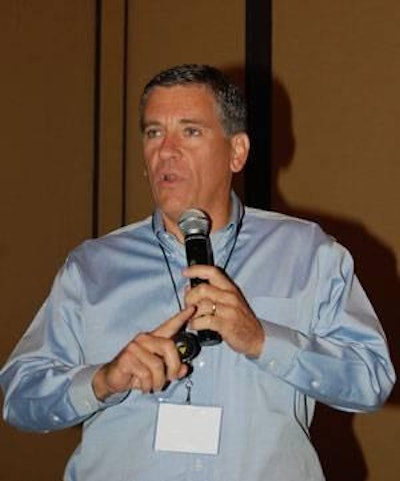
Involved with the United Egg Producers' Animal Welfare Advisory Committee from its inception in 1998 until a few months ago, Dr. Jeffrey D. Armstrong, president, California Polytechnic State University, defended the UEP’s welfare agreement with the Humane Society of the United States at the cooperative’s executive conference in Tucson. “This deal saves cages; that to me is a big deal. It is a big deal for bird welfare. It is a big deal for the consumer. It is a big deal for producers.”
Armstrong, who also serves as an advisor to McDonald’s Corporation on matters involving animal welfare and corporate social responsibility, said that national standards for laying hen welfare make sense for both the egg industry and consumers. He said that welfare for hens in enriched colonies will be better than for birds in traditional cages. Enriched cages allow for the expression of hen behaviors while maintaining the advantages of relatively small group size. He explained that without the enrichments, if you give the birds more room, they will peck each other and increase mortality.
Tipping point
"The industry is at a key tipping point just as it was before science based animal welfare guidelines were adopted,” Armstrong said. Public perception has shifted against housing birds in traditional cages because a bird can’t flap its wings in the cage like they can in enriched colonies or in cage-free housing. This shift in public opinion has reduced public trust in the egg industry. Armstrong said that public trust is a belief that activities are consistent with social expectations and the values of the community and other stakeholders. If public trust continues to erode, then the egg industry would lose its social license to operate, according to Armstrong.
Social license is the privilege of operating with minimal formalized restrictions; legislation, regulation or market requirements, based on public trust by doing what is right. Without a social license an industry faces greater regulation, litigation, and legislation which lead to a rigid, bureaucratic and high-cost industry.
National standards for hens are needed to shift the tipping point back to keep the egg industry’s social license intact, according to Armstrong. Otherwise even more control from outside can be expected.
Other options?
Armstrong said that he knows the UEP-HSUS agreement is not perfect. The cage space allocations in the agreement were not established based on research, they were negotiated, but he suggested that this agreement was the best deal available for egg producers. “It is easy to list reasons why the deal is bad, but it is difficult to list alternatives,” Armstrong said. “The agreement is not ideal, but I don’t think it is possible to keep the current (UEP Certified) guidelines with cages.”
The UEP established its animal welfare advisory committee in 1998 and in 2000 adopted science-based guidelines. The committee has made recommendations over the ensuing years and these voluntary guidelines have been modified as the science has progressed. Armstrong said that had UEP not chosen to take a unified approach back in 1998, the egg industry would be fragmented. Multiple states with cage bans would be in place, a great disparity between ballot initiative and non-ballot initiative states would exist and the industry’s social license would be equally fragmented. He stated that the end result would have been an unsustainable situation, with non-cage as the dominant source of eggs.
Because the UEP was proactive in 1998, the egg industry is in a much better place, according to Armstrong. He acknowledged that passage of federal legislation would be difficult, but he said that this was now the best course for the egg industry. He said that egg producers need to explain to the rest of animal agriculture that a non-cage future would be tough for the egg industry. He also said that producers need to ask other animal agriculture groups not to oppose the legislation without considering the impact on the egg industry if the legislation doesn’t pass.
The future of egg production
Armstrong challenged egg producers to think carefully about multiple futures for the industry. “I contend that pathways to saving cages are limited,” he said. “The science behind enriched cages is solid; public perception favors enriched cages and the HSUS. Economics favors non-enriched cages, how do you think that this will play with consumers?”
If legislation based on the UEP-HSUS agreement fails to pass in Congress, Armstrong cautioned the industry that the road could get quite rocky. He asked producers to think about how HSUS might act “with a busted deal.” “The fact that HSUS agreed to enriched cages will be dwarfed by the positive view they will receive by saying: We proposed what was best for the birds but the industry chose money and greed over hen welfare,” Armstrong said.
Armstrong challenged producers who oppose the deal to “make sure you have a plan B before you sink plan A.” He stressed again that a key to passage of the legislation would be to explain to the rest of animal agriculture the unique position that the egg industry is in, in regards to animal welfare.
Not just science
A holistic approach provides for evolutionary not revolutionary changes in the food supply chain, according to Armstrong. Science-based guidelines are key but not the only component to this approach. He said that research, education and extension programs must grow and adapt to the holistic approach.
Armstrong called on the egg industry to support the Coalition for a Sustainable Egg Supply. This organization is supporting a commercial-scale research project that evaluates the sustainability impact of cage-free aviary housing systems, enriched colonies and conventional cages. He also asked the industry to support the new research facility for alternative housing for layers at Michigan State University.
The increased cost of enriched cage eggs over those produced in conventional cages is around $0.01 per egg, according to Armstrong. He said that enriched cages offer welfare improvements over conventional cages and that enriched colonies are better than non-cage because of animal welfare and food affordability.


















